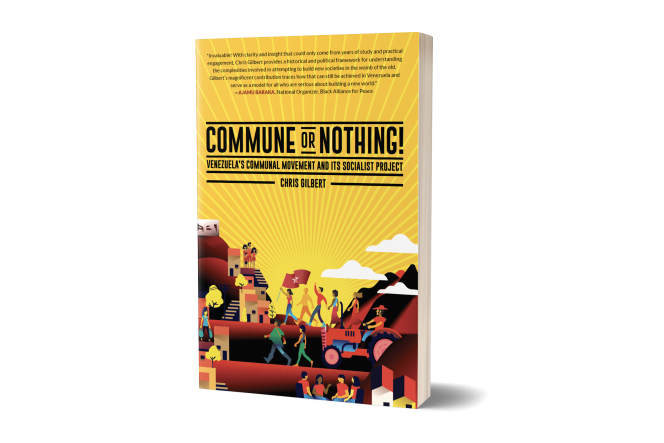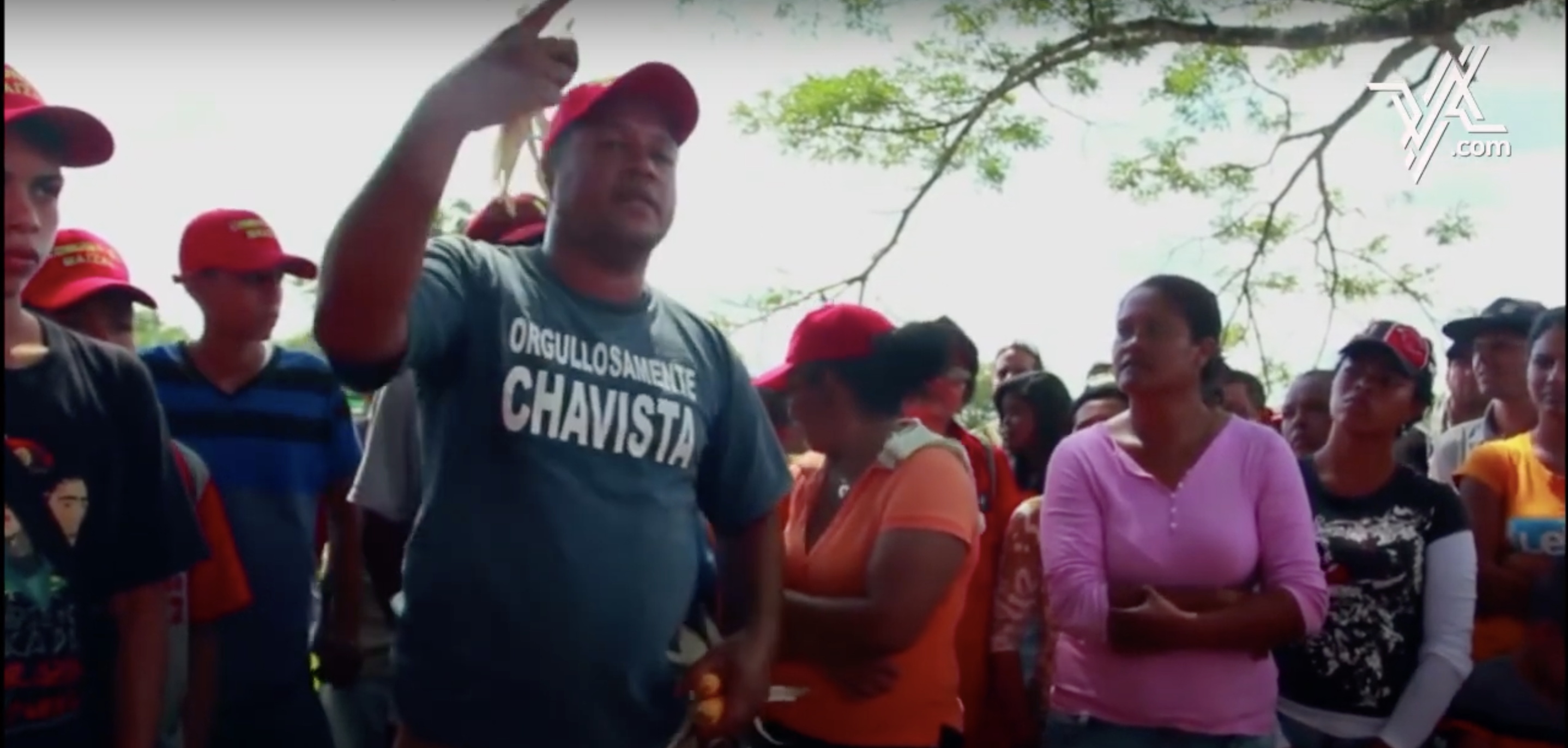Former Venezuelan President Hugo Chávez once called communes the “cells of socialism”[1] because he saw them as foundational units for building a truly socialist society that transcends the failures of 20th century socialism. By empowering local communities to manage resources and self-govern, Venezuela’s communes have embodied Chávez’s vision of participatory democracy and collective ownership, driving grassroots transformation from the bottom up. But their survival is now complicated by the highly contested result of the country’s 2024 presidential election.
Leftist social movements in the U.S. are also at a decisive conjuncture, contending with a fractured ecosystem that struggles to improve people’s living conditions amid rising neo-fascism, alienation from Democratic party politics, and imperialist support for the genocidal occupation of Palestine. What can U.S. leftists learn from Venezuela’s communal movement and its ongoing struggle against U.S. imperialism, toward liberatory organizing that attends to the needs of our communities?
The struggles and strategies of Venezuela’s communes are illuminated in Chris Gilbert’s book, Commune or Nothing! Venezuela’s Communal Movement and Its Socialist Project (Monthly Review Press, 2023). Gilbert, a professor of political studies at the Universidad Bolivariana de Venezuela and the creator and co-host of Escuela de Cuadros, a Marxist educational television program and podcast, argues that communes represent a practical realization of social justice principles. In particular, they demonstrate the tenets of and conditions for participatory democracy by fostering grassroots-level, collective decision-making and self-management that emerges from shared political clarity rather than a representational state apparatus. Gilbert’s work weaves together historical and political context, cultural memory’s legacies of resistance and solidarity, theoretical insights, and empirical anecdotes to illustrate the paths to, tensions faced by, and lessons from the design and implementation of these communes.
Historically, Venezuela’s communes, as conceptualized by Chávez, emerged from a specific political-economic conjuncture and was part of a broader project that he called “21st Century Socialism.”[2] For much of the twentieth century, a small elite controlled Venezuela’s wealth—especially its oil—leaving most of the population impoverished.[3] The 1989 “Caracazo” riots, a response to imposed austerity measures, highlighted widespread dissatisfaction with the neoliberal economic model and prompted demands for structural changes. Chávez, inspired by Marxism, liberation theology, and the legacy of Simón Bolívar, sought to address these inequalities through the Bolivarian Revolution. He envisioned communes as grassroots organizations that would decentralize power, facilitate participatory democracy, and economically empower marginalized communities. This model was also a response to international dynamics, particularly U.S. opposition to anti-capitalist projects and the rise of leftist governments across Latin America during the “Pink Tide.”[4] Chávez saw communes as essential to building a new socialist society, rooted in local traditions and resilient against external pressures.
An important contribution of Gilbert’s book is its explanation of the connection between the theories of Hungarian Marxist philosopher István Mészáros and Chávez’s conceptualization of the commune. Twenty-first century socialism, according to Mészáros and applied by Chávez through the communes, is a transitional framework that aims to not only undermine capitalism as an economic system, but also capital as the material expression/process of inherently exploitative social relations that sustains and is sustained by capitalism. This transition to new relations requires “a radical reorganization of society in which workers themselves consciously control production in a profoundly democratic way.” [5] This new transitional arrangement is what Chávez referred to as “‘the elementary triangle of socialism’—the organic unification of social property, social production, and satisfaction of social [communal] needs.”[6]
Gilbert’s book focuses on four communes—El Panal, El Maizal, Che Guevara, and Luisa Cáceres—to illustrate the different ways they built communal power and strategy based on their members’ material needs, the land’s natural resources (e.g., coffee, chocolate), their geographic location (e.g., rural communes met material conditions differently than urban communes), and members’ shared political clarity. On the latter, for instance, he writes that the Che Guevara commune’s coffee growers brought “their traditions of hard work and, just as often, the political consciousness of veteran leftists fleeing persecution.”[7]
Alongside such distinctions, Gilbert’s book demonstrates how Venezuelan communes share six key features: participatory democracy, self-management, aspirational economic autonomy, social inclusion and solidarity, strategic linkage with the State, and cultural and ideological programming. Taken together, these features allow for transitional and institutionalized changes that are needed to democratically manage resources. For example, through cultural and ideological programming, the communards’ rigorous political study enables awareness of their individual and collective power and an informed commitment to the revolutionary political project they aim to advance; the protagonism[8]—or political subjectivity—emerging from this awareness is what enables informed consent in a participatory democracy. Additionally, the communes’ strategic linkage with the State directs its governing power toward addressing the people’s needs, rather than that of capital, to further the political project of 21st century socialism.
Notably, the commune model that Chávez had conceptualized was not implemented until after he had passed away in 2013. Gilbert explains that the delay resulted from a combination of political priorities, institutional challenges, and, most importantly, a lag in “the project’s reception in the masses themselves.”[9] Through political education during an intensifying economic crisis, however, the masses came to view the communes as a necessity. This highlights the need for political clarity as a precondition for revolution.

Socialist Project (Monthly Review Press, 2023)
While Gilbert’s book chronicles how the communes dramatically improved the material and social conditions of the communards, they are not without challenges, such as resource shortages resulting from sanctions and hyperinflation.[10] This is to be expected because socialism is a process, not an outcome—or, in Angela Davis’s words, “freedom is a constant struggle.”[11] This struggle was especially pronounced during the 2024 Venezuelan presidential election. In August, the National Electoral Council declared Nicolás Maduro the winner with 51 percent of the vote; however, the opposition, led by María Corina Machado, accused Maduro of election fraud.[12] Machado claims that her party’s candidate, Edmundo González Urrutia, actually won the election.8 She has provided what she says is evidence of this, although the government dismisses these claims as forgeries. The disputed election has led to widespread protests across Venezuela. Meanwhile, the U.S. government has recognized Edmundo González as the presidential election’s winner—paralleling its recognition of Juan Guaidó as interim president in 2019.[13] This pattern of political manipulation and economic sanctions aims to destabilize Venezuela’s socialist project, which the U.S. perceives as a challenge to neoliberal and oil interests in the region. The election, therefore, becomes a critical juncture where the survival of these communes—and by extension, the broader project of democracy—is at stake.
The outcome of the 2024 U.S. presidential election also holds significant implications for Venezuela and global struggles for democracy. A far-right administration in the U.S. would likely support far-right figures like María Corina Machado and Juan Guaidó, who oppose the Chavista government. With a focus on undermining President Maduro, a far-right, anti-democratic U.S. administration would likely escalate sanctions and further isolate Venezuela on the international stage. [14] This strategy would fuel existing political tensions and deepen divisions within the country, potentially destabilizing the government. Increased U.S. sanctions, foreign interventions, and internal opposition may restrict the communes’ ability to function effectively, producing significant economic and logistical challenges and weakening their capacity to support vulnerable communities.
In many parts of the world, far-right leaders have risen to power by capitalizing on economic and social crises, often with the backing of neoliberal elites,[15] and movements characterized by nationalism, authoritarianism, and opposition to socialist principles. Their success could erode communal structures and reassert capitalist dominance in Venezuela and globally. This conjuncture calls for a renewed commitment to building and defending communal power as a decentralized bulwark against internal and external challenges to democracy.
Venezuela’s communal movement offers several important lessons for U.S. leftists as they confront fascistic forces. These lessons revolve around building grassroots power, building political clarity, and developing alternative structures that challenge the capitalist status quo.
First, building grassroots power is essential. Chávez mobilized poor and working-class communities and created a broad social base of support through the establishment of communal councils and participatory democracy. He also mentored a successor, Maduro, to continue the socialist revolution. U.S. leftists can learn from this by organizing locally, capturing state and institutional power, and building solidaristic, democratic community networks that can resist and safeguard against authoritarian tendencies.
Second, building political clarity is crucial. Venezuela’s leadership articulated a clear vision against neoliberalism, framing their struggle in terms of class conflict and imperialism. Leftists in the U.S. should define their struggles, situational objectives, and privileges (including and especially imperial privilege) more clearly, engaging in ongoing conjunctural analyses to better understand—and thereby better strategize through—the capitalist and imperialist forces coming together to create particular conditions and contradictions.[16]
Third, developing liberatory infrastructure and relations that challenge the capitalist status quo is necessary. The Venezuelan communes built new structures and processes based on cooperative ownership and communal decision-making. Similarly, U.S. leftists can create practical, sustainable alternatives to capitalist exploitation—from supporting cooperatives that engage a socialist politic to developing local currencies and other means of exchange that do not rely on capitalist financial institutions—and build resilience against right-wing authoritarianism. Cooperatives are often presented as a solution toward economic democracy,[17] a paradigm that seeks to shift ownership and decision-making power toward people to manage their collective needs. But as Gilbert points out, without an explicitly socialist politic, conventional cooperatives can replicate capitalist relations because property is still privatized, albeit in a collective way, and decision-making is often still exploitatively hierarchical.[18] At the same time, social movement organizations, especially in the U.S., do not necessarily or consistently have programming that builds the institutions and structures to meet their base’s material needs. The communes are an invitation to anchor both U.S. social change ecosystems (cooperatives and movement organizations) to a socialist politic to resolve these contradictions and gaps, and to both prefigure and institutionalize the relations needed for a liberatory world.
Together, these strategies can form a robust foundation for resisting fascistic tendencies and advancing social justice.
Endnotes
[1] Chris Gilbert and Cira Marquina Pascal, “News from Nowhere” — Building Communal Life in Venezuela,” Progressive International, January 19, 2023, https://progressive.international/blueprint/1c235d6f-72d4-4973-b76d-939a4655f028-news-from-nowhere—building-communal-life-in-venezuela/en.
[2] Marta Harnecker, A World to Build, New Paths toward Twenty-first Century Socialism (NYU Press, 2015), 8.
[3] Gregory Wilpert, “The Economics, Culture, and Politics of Oil in Venezuela,” Venezuelanalysis, August 30, 2003, https://venezuelanalysis.com/analysis/74/.
[4] Chris Gilbert, “The Dream of a Thing: Refounding the Economy of a Venezuelan Commune,” Venezuelanalysis, June 19, 2024, https://venezuelanalysis.com/analysis/the-dream-of-a-thing-refounding-the-economy-of-a-venezuelan-commune/.
[5] István Mészáros, Beyond Capital: Toward a Theory of Transition (Monthly Review Press, 1995), 87.
[6] John Bellamy Foster, “Mészáros and Chávez: ‘The Point from Which to Move the World Today,’” Monthly Review, June 1, 2022, https://monthlyreview.org/2022/06/01/meszaros-and-chavez-the-point-from-which-to-move-the-world-today/.
[7] Chris Gilbert, Commune or Nothing! Venezuela’s Communal Movement and Its Socialist Project (Monthly Review Press, 2023), 70.
[8] Marta Harnecker, Ideas for the Struggle (Socialist Project, 2010), https://socialistproject.ca/content/uploads/2017/11/struggle.pdf; Michael Lebowitz, “Popular Protagonism in the Transition to Socialism,” The Bullet, Socialist Project, July 28, 2020, https://socialistproject.ca/2020/07/popular-protagonism-in-transition-to-socialism/, for more on the political concept of protagonism.
[9] Gilbert, Commune, 19.
[10] Cira Pascual Marquina and Chris Gilbert, “Venezuela’s El Maizal Commune in the face of the sanctions,” Monthly Review, August 2, 2021, https://monthlyreview.org/press/venezuelas-el-maizal-commune-in-the-face-of-the-sanctions-cira-pascual-marquina-and-chris-gilbert-on-venezuelanalysis/.
[11] Angela Davis, Freedom is a Constant Struggle: Ferguson, Palestine, and the Foundations of a Movement (Haymarket Books, 2016).
[12] Alfredo Meza, Stefano Pozzebon and Abel Alvarado, “US says Maduro lost Venezuela election as opposition leader says she’s in hiding,” CNN, August 1, 2024, https://www.cnn.com/2024/08/01/americas/venezuela-election-opposition-machado-hiding-intl-latam/index.html.
[13] Miguel Tinker Salas, “As Venezuela Coup Attempt Fails to Overthrow Maduro, Guaidó Calls for More Street Protests,” Democracy Now!, May 1, 2019, https://www.democracynow.org/2019/5/1/as_venezuela_coup_attempt_fails_to.
[14] Mision Verdad, “Another Political Labyrinth of Anti-Chavismo Begins With Donald Trump’s New Term,” Resumen, November 11, 2024, https://resumen-english.org/2024/11/another-political-labyrinth-of-anti-chavismo-begins-with-donald-trumps-new-term/.
[15] Alessandro Bonanno, “Crisis of neoliberalism, populist reaction, and the rise of authoritarian capitalism,” International Review of Modern Sociology 45, no. 1 (2019): 9–26, https://www.jstor.org/stable/4863676.
[16] “Liberatory Strategy Toolkit,” LeftRoots, 2023, https://dusk.leftroots.net/liberatory-strategy-toolkit. LeftRoots offers a guide for how to perform conjunctural analysis.
[17] “Home,” Center for Economic Democracy, accessed October 22, 2024, https://economicdemocracy.us/, for a broad definition of economic democracy, which has many interpretations.
[18] Gilbert, Commune, 88.

